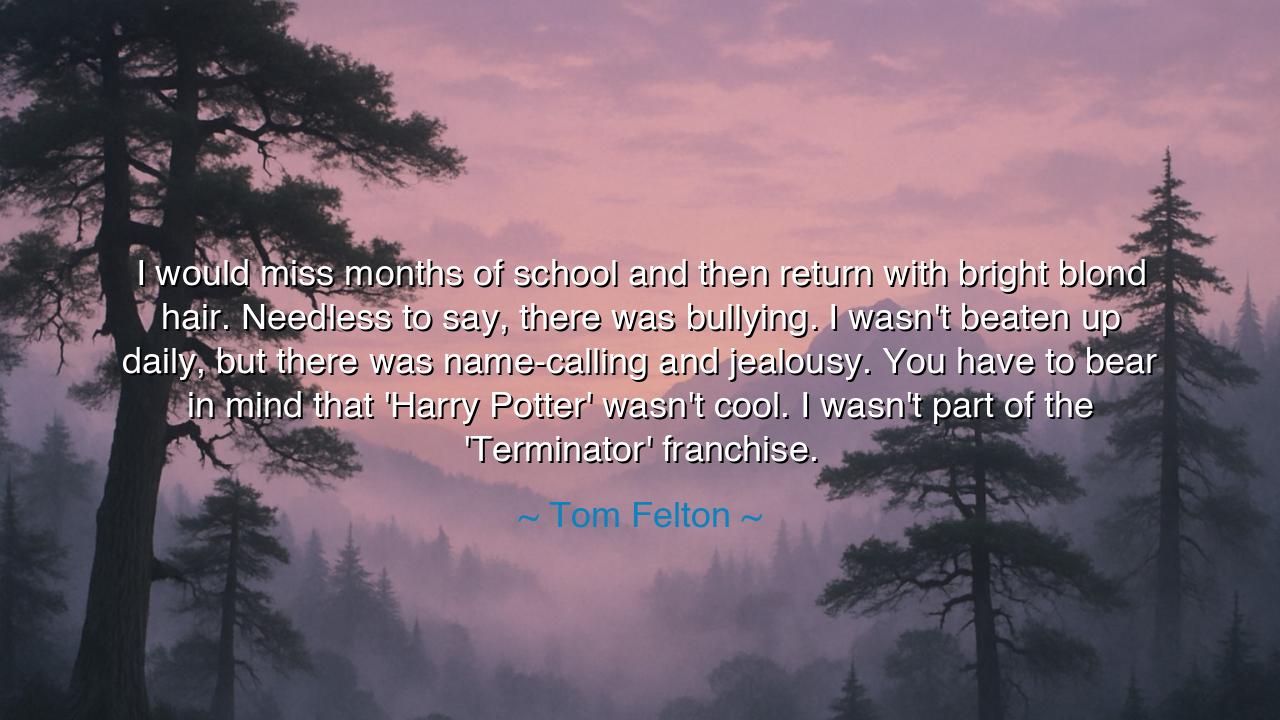
I would miss months of school and then return with bright blond
I would miss months of school and then return with bright blond hair. Needless to say, there was bullying. I wasn't beaten up daily, but there was name-calling and jealousy. You have to bear in mind that 'Harry Potter' wasn't cool. I wasn't part of the 'Terminator' franchise.






Tom Felton, in reflecting upon his childhood and the challenges of fame, speaks to a deep and universal truth: "I would miss months of school and then return with bright blond hair. Needless to say, there was bullying. I wasn't beaten up daily, but there was name-calling and jealousy." This simple statement holds within it the weight of the human experience—alienation, bullying, and the cost of standing out in a world that often prizes conformity. It speaks to the price of individuality in a society that, while deeply fascinated by the new, is quick to judge those who do not conform to its expectations.
The ancients, too, understood the pain of standing apart from the crowd. In the stories of Achilles, the greatest of Greek warriors, we see not only a man of unmatched strength and heroism, but also one who suffers because of his very greatness. His anger and pride made him a figure to be admired and feared, but it also isolated him from his comrades and from the world he sought to protect. Felton's words echo this ancient dichotomy: those who stand out often bear the weight of jealousy and ridicule—the very qualities that come with greatness, but also with vulnerability.
Consider the tale of Socrates, the great philosopher of Athens. He was not only revered but also ridiculed. His refusal to conform to the norms of society, his habit of questioning the very foundations of Athenian life, led to scorn from those who preferred the security of tradition. Ultimately, Socrates’ greatness, his willingness to challenge the status quo, led to his trial and eventual execution. In many ways, Socrates' life mirrors that of anyone who dares to be different—whether through intellect, appearance, or, as in Felton's case, fame. He was bullied not by physical force, but by the weight of a society uncomfortable with those who refuse to fit into preordained roles.
Felton's experience of being alienated by his appearance and his role as Draco Malfoy in the "Harry Potter" series is a modern reflection of this age-old struggle. Though the world loved the films and the characters, Felton was not immune to the dark side of fame. The bullying he experienced—name-calling, jealousy, and the sharp sting of exclusion—was not unlike the challenges faced by many who find themselves thrust into the spotlight before they are ready. In ancient times, those who were thrust into leadership or power often felt the weight of public scrutiny, but as Felton reveals, even those who are merely seen as "different" in their youth suffer the sting of ostracism.
The lesson here is one of strength in adversity. Felton's words remind us that standing out comes with both benefits and burdens. Just as Achilles, Socrates, and countless other figures of legend were forced to bear the weight of their differences, so too must we find the strength to endure when the world turns its gaze upon us with judgment. To be an individual, to be unique, is to invite both admiration and ridicule. But in the crucible of bullying and name-calling, true character is forged. We must not shy away from being who we are, even when the world demands we conform. The courage to remain true to oneself is a lesson that transcends time, from the ancients to the present day.
The true power lies in how we respond to these challenges. Felton's resilience, as he reflects on the experience, is not simply about surviving the bullying but about recognizing that the world’s judgment does not define him. Success lies not in avoiding pain or hardship but in embracing them as opportunities for growth. When we face scorn or jealousy, we must recognize that it is not our weakness that invites ridicule, but our strength. Like a great tree that stands firm against the storm, we too must remain unshaken in our conviction and our identity.
In our own lives, we are all faced with moments where we must choose to either conform or embrace the path of the individual. Let us take Felton's experience as a reminder that our differences—whether they lie in our appearance, our beliefs, or our passions—are what make us unique, and ultimately, what make us strong. We must face the challenges of bullying and judgment with the same courage as the heroes of old, finding in each trial an opportunity to build our own legacy of strength, resilience, and self-belief.






AAdministratorAdministrator
Welcome, honored guests. Please leave a comment, we will respond soon